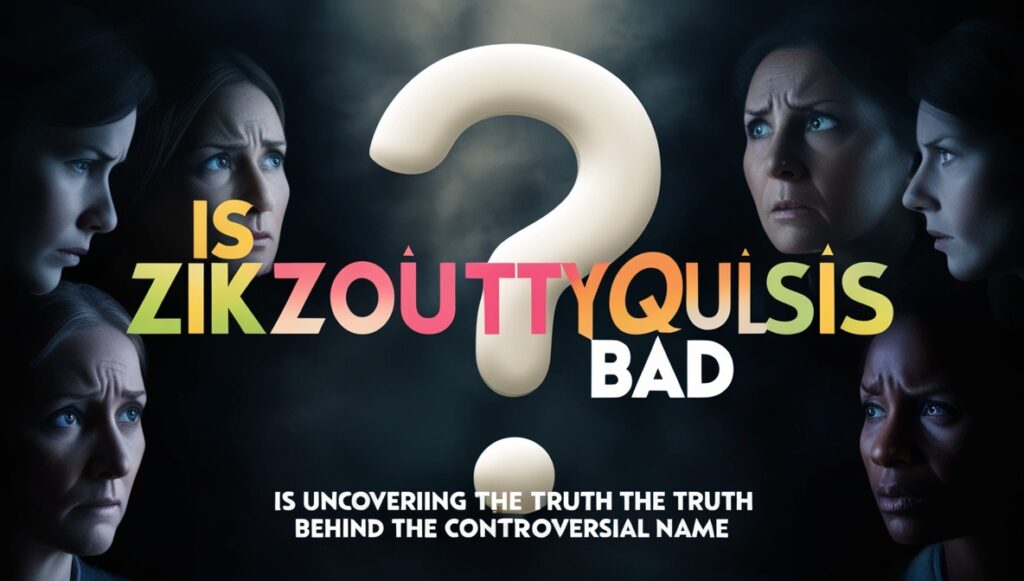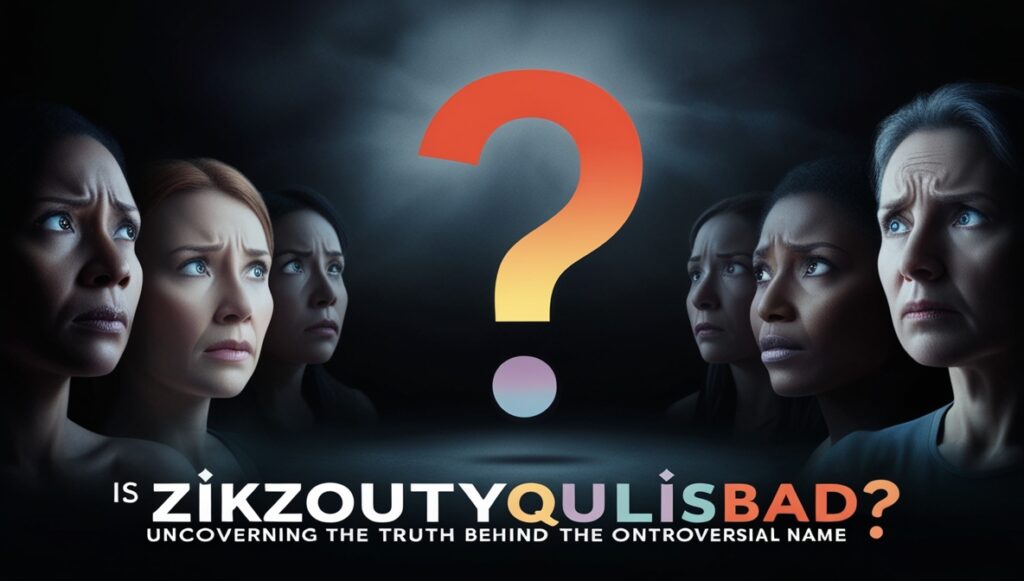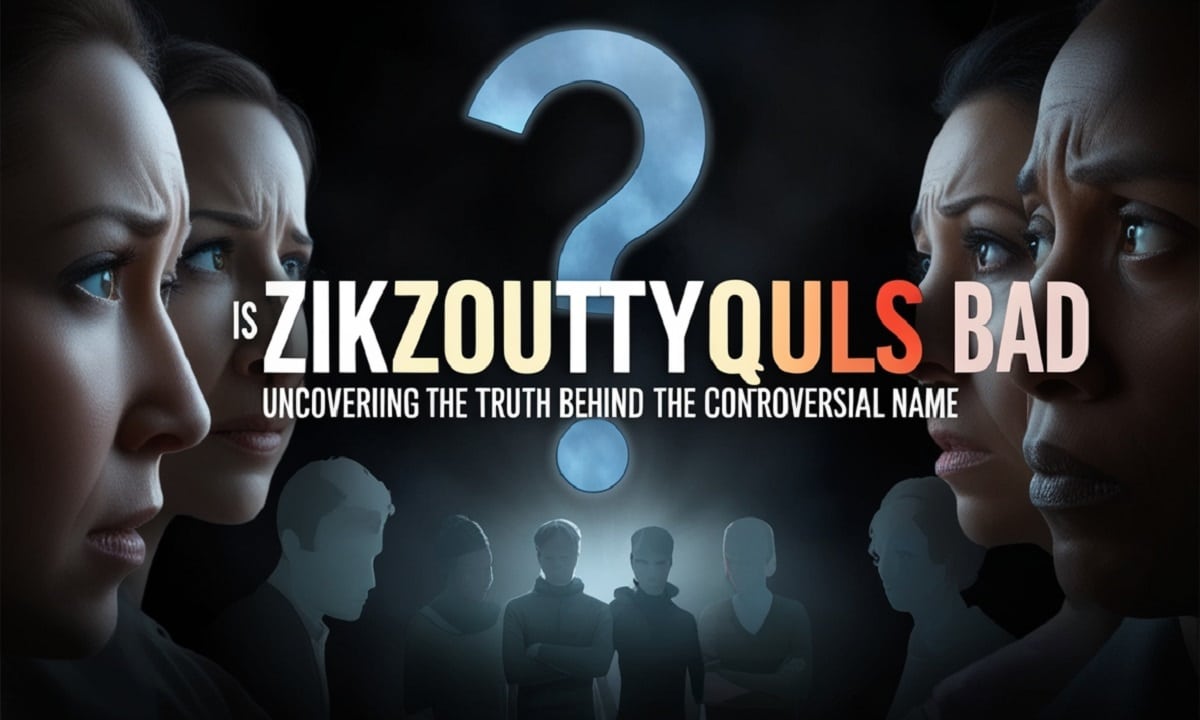The internet has a strange way of turning obscure words into viral phenomena. One moment a term is buried in underground forums, and the next it dominates social feeds. That’s exactly what happened with Zikzoutyqulsis—a phrase that sparked heated debates, viral speculation, and countless memes. But the bigger question remains: Is Zikzoutyqulsis bad?
This article dives deep into the origins, health debates, digital amplification, and real-world reactions surrounding this controversial name. You’ll discover expert opinions, fact-checked claims, and practical guidance to help separate truth from hype.
Understanding Zikzoutyqulsis
At its core, Zikzoutyqulsis is both a controversial internet term and a niche product label. Depending on who you ask, it represents:

- A viral internet mystery born in underground communities.
- A possible experimental wellness supplement marketed as a productivity enhancer.
- A digital urban legend amplified by memes, blogs, and influencers.
The ambiguity fuels speculation. Some see it as a harmless joke, while others worry it masks fake health products or unregulated supplements.
Zikzoutyqulsis Meaning and Interpretations
The meaning of Zikzoutyqulsis shifts depending on cultural lens and context.
- Linguistic breakdown: The word itself carries no direct etymology, yet sounds complex and mysterious.
- Symbolic use: In digital subcultures, it became shorthand for pseudoscience claims and internet paranoia.
- Public interpretation: Many associate it with scams, hoaxes, or placebo effect products.
“The meaning of Zikzoutyqulsis is less about language and more about perception,” notes one Digital Culture Analyst.
Origin of Zikzoutyqulsis
The origins of Zikzoutyqulsis trace back to underground forums where anonymous users hyped obscure supplements. Soon, copy-paste warnings spread across Reddit, fueling curiosity.
Timeline of Spread
| Year/Phase | Event |
|---|---|
| Early mentions | Appeared in digital subcultures discussing productivity boosters |
| Viral speculation | Memes spread on Reddit and YouTube |
| Mainstream exposure | Blogs and influencers amplified concerns |
| Widespread attention | Labeled a hoax phrase and subject of internet meme culture |
Its rise mirrors other internet urban legends, where a mix of curiosity, satire, and paranoia pushes obscure content into the spotlight.
Why Some People Believe Zikzoutyqulsis Is “Bad”
Several factors created the “bad” label:
- Scam suspicions: Linked to unregulated supplements with bold productivity booster claims.
- Fear of the unknown: The complex name alone sparked suspicion and internet paranoia.
- Health concerns: Users posted about side effects like fatigue, nausea, and headaches.
- Misinformation amplification: Blogs and influencers spread warnings without evidence.
Many compare the panic to health conspiracy theories that thrive on digital misinformation.
Fact-Checking Claims About Zikzoutyqulsis
Common Claims and Truths
| Claim | Reality Check |
|---|---|
| It’s a dangerous supplement | No scientific evidence proves direct harm. |
| Causes anxiety and liver damage | Only anecdotal reports, no clinical validation. |
| A scam product | Some sellers exploit the name, but the term itself isn’t inherently fraudulent. |
| Banned by authorities | No regulatory bodies have officially restricted it. |
| Universally hated | Communities online show mixed humor, satire, and curiosity. |
The scam vs legitimacy debate stems more from marketing than from the word itself.
Expert Insights and Neutral Perspectives
Experts provide balanced views rather than fear-driven narratives.
- Linguists describe Zikzoutyqulsis as a hoax phenomenon shaped by digital imagination.
- Digital Culture Analysts emphasize virality mechanics and meme-driven hype.
- Health professionals caution against unregulated supplements but stress the absence of hard evidence.
- Researchers in digital culture studies classify it as an evolving case of digital misinformation.
Researchers’ Views and Data-Driven Evidence
Research into viral terms like Zikzoutyqulsis highlights several insights:
- Placebo products often thrive in wellness supplements controversy.
- Surveys show consumer skepticism rises when product names feel pseudoscientific.
- Viral phrases attract attention regardless of legitimacy, fueling consumer trust erosion.
A comparison of digital hoaxes shows similar cycles:
| Viral Name | Core Fear | Reality |
|---|---|---|
| Zikzoutyqulsis | Health risks | No clinical proof |
| Tide Pods | Poisoning risk | Proven harmful if ingested |
| 5G Conspiracy | Radiation fears | Debunked |
Expert Consensus Summary
After reviewing all input:
- There is no scientific evidence proving Zikzoutyqulsis is harmful.
- Health risks reported online lack proper clinical backing.
- The controversy stems from internet speculation and hype, not facts.
- Experts advise critical thinking before spreading or believing viral claims.
Real-World Impact and Community Reactions
Reactions to Zikzoutyqulsis vary widely:
- Reddit threads show a mix of paranoia and humor.
- YouTube testimonials describe supposed side effects, though many lack credibility.
- Blogs amplified fear by recycling unverified claims.
- Memes turned the term into satire, reducing seriousness.
Community tone swings between mockery, curiosity, and alarm—a hallmark of internet meme culture.
Debunking Myths Around Zikzoutyqulsis
- Myth 1: It’s dangerous.
- Reality: No hard evidence supports this.
- Myth 2: It’s a scam.
- Reality: Some misuse the name, but the term itself isn’t fraudulent.
- Myth 3: Everyone hates it.
- Reality: Many treat it as a joke or meme.
- Myth 4: It’s banned.
- Reality: No bans from regulatory bodies exist.
This myth debunking highlights the role of copy-paste warnings and social media exaggeration in amplifying falsehoods.
Practical Guidance for Readers
To approach viral controversies like Zikzoutyqulsis, follow these steps:

- Check sources: Verify claims with reliable outlets, not viral blogs.
- Look for evidence: Seek studies or statements from consumer watchdogs.
- Practice critical media literacy: Question exaggerated claims and pseudoscience.
- Avoid spreading fear: Don’t repost warnings without proof.
“Misinformation thrives on clicks. Knowledge thrives on facts.”
Final Verdict: Is Zikzoutyqulsis Bad?
The evidence shows Zikzoutyqulsis is not inherently “bad.” It’s a viral internet mystery shaped by digital culture and misinformation amplification. While users reported side effects, there is no scientific validation of harm.
The controversy highlights larger issues: fake health products, consumer skepticism, and the power of virality mechanics.
Conclusion
Zikzoutyqulsis illustrates how the fear of the unknown fuels digital hype. What began as niche chatter in underground forums turned into a full-blown internet speculation storm.
The lesson? Approach viral controversies with critical thinking and digital literacy. Don’t let memes and unverified claims dictate your beliefs.
FAQs About Zikzoutyqulsis
What does Zikzoutyqulsis mean?
It refers to a controversial term linked to both memes and unregulated supplements.
Why do people say Zikzoutyqulsis is bad?
Because of health rumors, scam suspicions, and social media exaggeration.
Is there any scientific proof that Zikzoutyqulsis is harmful?
No. Reports of side effects exist, but no clinical evidence confirms risks.
Should I be worried about Zikzoutyqulsis?
Not necessarily. Just avoid unregulated products tied to the name.
Is Zikzoutyqulsis a scam or legitimate?
The word itself isn’t a scam. Some sellers misuse it for marketing.
How did Zikzoutyqulsis go viral online?
Through Reddit discussions, YouTube videos, and meme-driven amplification.
Are there cultural reasons some dislike the name?
Yes. Complex names often trigger skepticism and internet paranoia.

